Origin great Carl Webb’s heartbreaking interview about MND battle
Carl Webb is under no illusions about what his future holds as he fights an invisible opponent. In an incredibly brave and raw interview, he talks about his decline fighting MND.
NRL
Don't miss out on the headlines from NRL. Followed categories will be added to My News.
In his pomp as a Queensland State of Origin star, Carl Webb was one of the strongest men in Australian sport, a raw-boned pocket battleship who could bench press 170kg without raising a sweat.
Today, Webb struggles to hold a bag of groceries.
They say a week is a long time in politics.
For a sufferer of Motor Neurone Disease, a year is an exhausting, confronting, debilitating journey that tests the individual physically, emotionally and spiritually.
For ‘Charlie’ Webb, a man once so powerful and strong that no former Broncos teammate dared enter the boxing ring with him during pre-season training sessions, the daily fight against an invisible opponent examines every scintilla of his soul.
“Everything you do is just a battle,” says Webb.
“Day by day, I’m on a slow decline … but I’m not about to just roll over.”
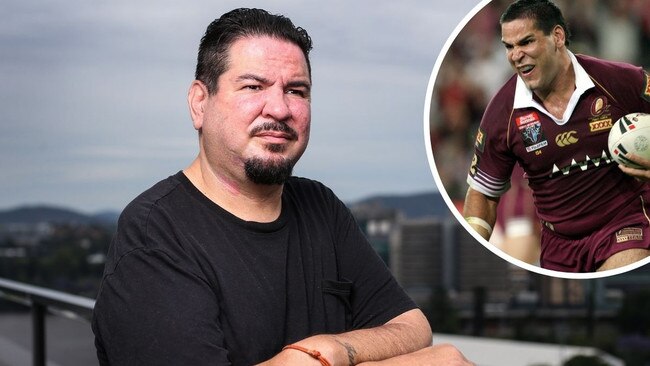
Almost two years after being diagnosed with MND, Webb opened up to The Sunday Mail in a candid, raw and heartbreaking interview about his increasingly challenging battle with the terrible disease.
Motor Neurone Disease is a progressive neurological disorder that destroys the cells that control muscle activity, making it difficult to move and eventually breathe, speak and swallow.
This Friday, almost 300 guests will gather for a function in Brisbane to support the Carl Webb Foundation, set up to provide financial and medical assistance for sufferers of MND.
Rugby league royalty will be in the room, including Webb’s great footballing mates Johnathan Thurston, Darren Lockyer and Kevin Walters, all of whom cannot comprehend the diagnosis, and the road ahead, for their beloved friend.
The past 12 months have been particularly taxing for Webb.
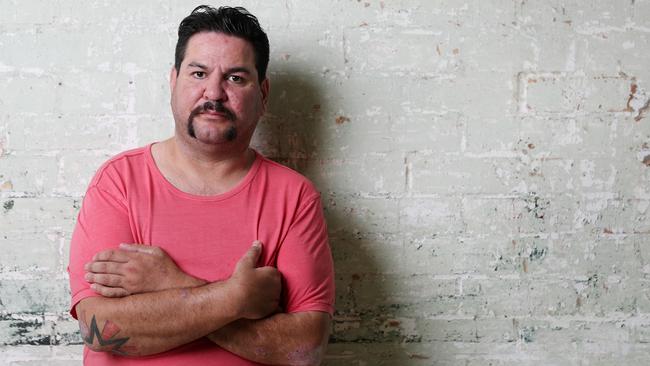
Initially, he was able to function independently, embarking on camping trips with his four kids.
In recent months, the 40-year-old former Broncos, Cowboys and Eels forward has confronted the true ravages of the incurable disease. Long walks require a powered wheelchair.
The fine-motor skills that enabled him to palm off opponents and hold a football one-handed are failing.
He requires daily assistance.
“I can see a big difference in the past year. I have declined a fair bit,” Webb says.
“Getting dressed in the morning is a task. I struggle to button my shirts up and pull my trousers and shorts up.
“I can still walk, but my legs are starting to get a bit sloppy. I drag my feet a bit. If I fall, it’s a real struggle to get back up. I can’t push myself up.
“Strength was a big thing for me, I was always strong, but now my strength is gone.
“I am losing all muscle definition. It’s starting to waste away.”
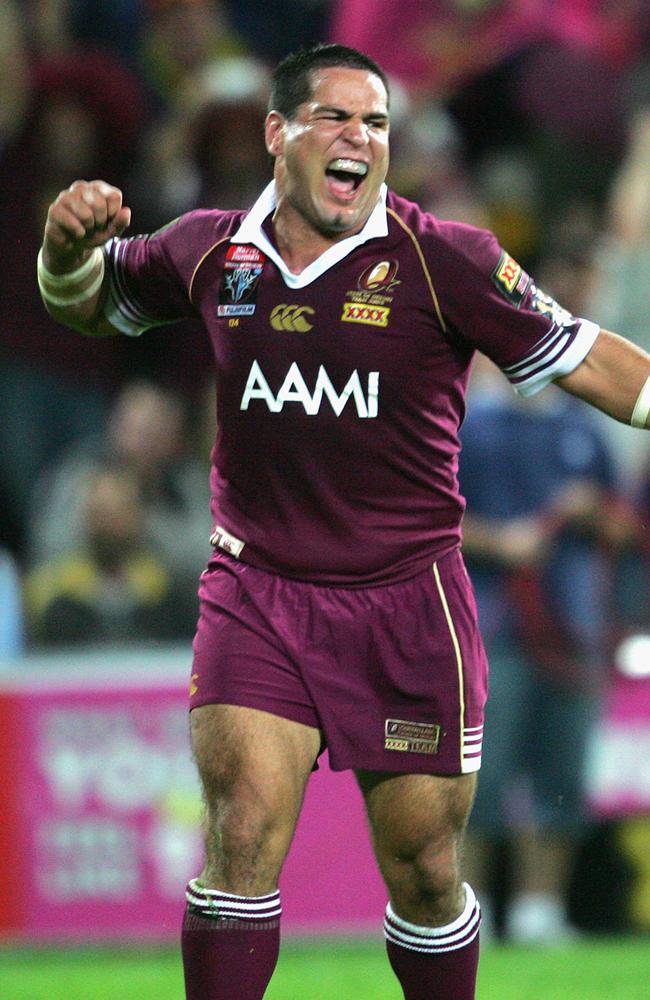
The daily mundane tasks millions of Australians take for granted can leave Webb exhausted.
“If I’m going out for a big day, I will take my powered chair,” he says.
“After 10 or 20 minutes of walking, I start dragging my feet and I’m at risk of tripping over.
“Falling over could mean anything, broken bones. Even just getting back up is scary.
“Opening car doors, buttering bread, getting out of a taxi, doing the buttons on your kids’ clothes. That stuff is challenging now.
“It’s an effort for me to put something in the microwave. I’m certainly not making roast dinners. Even pulling a container out of the microwave is difficult.
“I have a swipe card to get into my unit because I don’t want to be fiddling with keys.
“Doing a big shop is impossible for me. I can’t get stuff up the stairs, so thankfully my partner (Cassandra) helps out, because I can’t carry the groceries.
“I just get so fatigued so easily. If I go out for the morning, I come home pretty stuffed and need a sleep.
“At first, it (the MND diagnosis) was hard to accept, but that’s the condition. I have to accept it.
“To cope, I have tried to cultivate a strong mental attitude and somehow deal with it.”
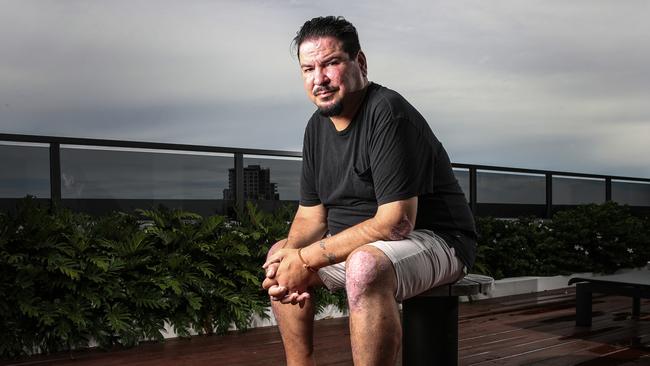
It’s why this week’s luncheon has multifaceted meaning for Webb. The Foundation is not just about helping other MND sufferers, but creating a lasting legacy for his children, his mates and himself.
The theme of the day is ‘Locked In’.
It is a reference to the fact that while Motor Neurone Disease can attack the human body’s estimated 37 trillion cells, most MND sufferers retain their mental faculties.
Mentally, Webb is still sharp, articulate, effusive and Locked In for the fight of his life.
“I can’t wait to see so many great rugby league mates,” Webb said.
“After my diagnosis, I sat down and worked out some of my priorities in life moving forward.
“The big one was spending time with my kids, friends, family and loved ones.
“Setting up the Foundation has not only strengthened my existing relationships, but it has fostered new ones with other MND sufferers and the many great services available to help people with the disease.
“I find it comforting talking to other sufferers. They talk about dragging their feet and their tough times and automatically I understand their journeys and the struggles they encounter.”
The rugby league world was left in a state of shock when Webb was diagnosed with MND in February 2020, a month before his 39th birthday.
The scenario was beyond unfathomable.
This was Carl Webb, a tackle-busting, 108kg powerhouse who produced one of the greatest debuts in State of Origin history when, at age 20, he bulldozed five NSW players to score the solo try that inspired Queensland’s fairytale 2001 series win.

Two decades later, Webb lives in a specially-modified unit in Brisbane, just 4km from the scene of the Suncorp heroics that made him a Queensland hero.
“I was just looking at that photo of my try the other day,” says Webb, who played 187 first-grade games for the Broncos, Cowboys and Parramatta between 2000-11, as well as 12 Origin games for Queensland and one Test for Australia in 2008.
“I have the landscape photo of that Origin try. That whole series was probably the greatest highlight of my career.
“I probably didn’t really fulfil my potential, but the one thing I treasured from my time in rugby league was the friends I made.”
One of those friends is Mark Burgess. Nicknamed ‘Chopper’, Burgess is a three-time Australian amateur heavyweight champion who served as a protection officer for former Queensland Premier Peter Beattie.
During his Broncos career, Webb was ordered to take up boxing training to shed some excess pounds.
Brisbane teammates were too scared to fight him, so ‘Chopper’ was summoned.
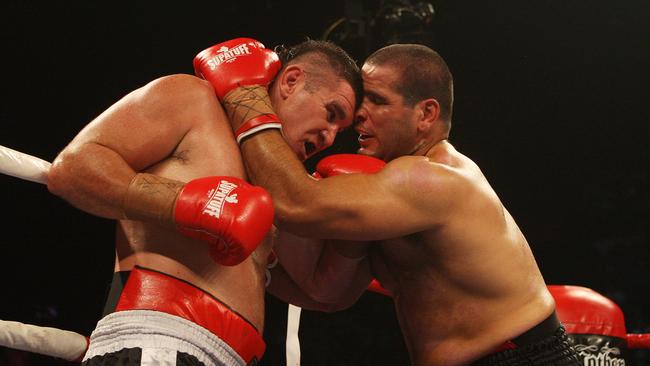
“During Carl’s football career, we traded 40 or 50 rounds to keep him fit and built a real bond,” Burgess recalls.
“I’ve had more than 100 amateur fights and Charlie hit me as hard as anyone I’ve fought.
“When I found out about Carl’s diagnosis, I rang him immediately. I was devastated.
“I just feel so upset to see Carl getting worse. I say why Charlie?
“He really was a powerhouse. When I punched him, it would hurt my hands and when he hit me, it was like being hit by a sledgehammer.”
It was in those very hands of granite that Webb sensed something was not right.
After a shift one day working the mines in Dysart in November 2019, Webb struggled to hold a dinner plate. A few days later, he started fiddling with the buttons on his shirt.
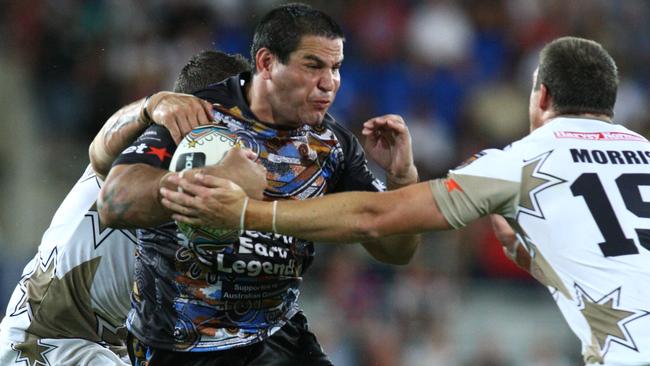
“I had nerve conduction tests done and a month later, the specialist told me I had Motor Neurone Disease,” he said.
“I was in a daze. I didn’t know what to do. I had never met anyone with MND.
“I was just consumed by shock. It was such a f***ing shock and I thought, ‘Where on earth do I go from here?’.
“I’ve been so lucky to get help from the Men of League and there are so many great services like the Network Nursing Agency. Everyone loves their privacy, but I’ve had to develop close relationships with my in-house carers.
“I get emotional some days. For 10 or 15 minutes, I do get the shits, but then I quickly centre myself and get back to what’s really important.”
The centre of Webb’s universe are his four kids.
There is a sudden sunny inflection in Webb’s voice when he speaks of Carter, 15, Hunter, 11, Brooklyn 9 and three-year-old Tyson.
The average life expectancy of an MND sufferer is two to three years. Webb is acutely aware of his mortality, but the Foundation is his everlasting work and legacy to provide a better future for his children.
“I’m under no illusions about what’s to come in the future,” Webb said.
“That will be the biggest thing for me, to let them go.
“My kids have been amazing. They know dad is sick. It’s hard for them to watch me in decline.
“They are at an age where they will remember all this, so all I want now is to really enjoy the time I have left with them. I want some quality of life.
“My kids are my legacy. I want the best of me in my children … I just want them to have a wonderful future ahead.”
More Coverage
Originally published as Origin great Carl Webb’s heartbreaking interview about MND battle





